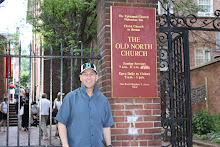Last night I was privileged to sit in on a lecture at Alberta Bible College given by Dr. Irving Hexham, a scholar of world religions who teaches in the Department of Religious Studies at the University of Calgary. Irving is a Christian, but his professional life centers not only on his own faith choice but on all religions. In the course of his work he regularly writes and lectures on the place of Christianity in our religiously pluralistic world. The lecture was very good. New info for me concerned the widespread impact on prominent theologians of Thomas Paine. I knew of Paine and have read some of Paine, but I certainly didn't know that he had impacted Feuerbach and Wellhausen. I don't know enough of the latter two to say if Hexham has this right, but if he does, I find it very interesting.
Hexham's main point was that Canada is experiencing the same kind of demise of Christianity that much of Europe has experienced, and he offered reflections on this and a challenge for churches to do something about it. What I appreciated most was his call for intellectual engagement on the part of evangelicals. Many times I have heard people talk about how so and so went to university and lost his or her faith, or about how so and so became too smart or too educated for Christianity. The latter comments I have always found very strange, and the comment about university students losing their faith I find very unfortunate. In both cases I find that the problem is not that students or others start to be challenged by thoughts that are too deep or that are irrefutably critical of religious faith. It is actually exactly the opposite. This is even the case for graduate students who go to seminary or who study religion or, specifically, Christianity in any academically rigorous environment. The problem is not that they look too deeply into things, but that they so quickly in their searches think that they have fournd irrefutable challenges to religious perspectives. I am often surprised when I read athiests or hyper-critical scholarship at how unsubstantiated their opinions about faith systems really are, but one may not see this upon a cursory glance or after taking a couple of university level courses in religion. That despisers of religion find something unproven in Christianity or some other faith does not mean that their perspectives are proven, or even that they are intellectually profound, but many of those with faith never allow their searches to take them to a place where this can be seen. Nor do faithful people allow room for the fact that while someone may successfully challenge some feature of Christianity or another faith system, this does not constitute a refutation of the entire faith system. Instead, faithful people are often like teenagers who hear from their peers something that contradicts the beliefs or values of their parents, and without even knowing how to check out the truth of the opinions of their peers, they accept them because we all tend to have a bit of a rebellious streak. So, when we hear something that contradicts the faith system in which we were raised, we immaturely accept the validity of the challenges, without really doing the intellectual investigation needed to be discerning.
No doubt part of our problem is the general lack of intellectual discernment and unwillingness to explore ideas in print (people don't read!) that so typifies our society. And, of course, it is getting worse. This accounts for so much laziness, sloppiness, and lack of concern on the parts of evangelicals when it comes to thinking seriously about faith. It is so easy to continue just to believe and trust either 1) the shallow, not very discerning stances that our faith has often taken, leaving us as believers unequipped to deal with challenges; 2) the insufficiently defensible positions that challenge our simplistic, not very discerning faith systems, leaving us unbelievers who unsuccessfully dealt with these challenges, when really there is so much more that should have been considered. Obvioulsy, neither of these options should be selected by anyone with the ability to do otherwise.
So, I would say Dr. Hexham has it right that the church must promote something different than the simple acceptance of belief claims coupled with ignorance regarding the challenges that will continue to face Canadian Christians. He may have overstated the problems we have in sending our children to Christian schools. These don't have to be intellectual ghettos that simply reiterate the same faith claims we have always made while closing our ears to our challengers. I think it is wise to have our children very well grounded before they face challenges on the world's terms; it is best to see them first in environments that will challenge them, where they can face new perspectives, but where they can reflect upon such challenges in a context that inculcates faith along with serious intellectual rigor. But when this has taken place, or when individual Christians have been well prepared at church or at home, there is simply no reason to fear intellectual challenges to our faith, or to be put in environments that will educate in challenging ways, because we must prepare people who can not only remain faithful but who can state their faithfulness in compelling ways before the world - a world into which they must enter in order to be the church in the world.
Friday, January 18, 2013
Subscribe to:
Post Comments (Atom)

No comments:
Post a Comment